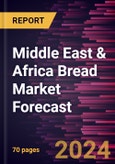High Demand for Gluten-Free Products Fuel the Middle East & Africa Bread Market
There is significance increase in the awareness and diagnoses of gluten-related disorders such as celiac disease and gluten sensitivity among the consumers. As a result, more individuals are seeking gluten-free alternatives to manage their conditions effectively. Celiac disease is an inherited autoimmune disorder. The symptoms are triggered by "gluten," the name was given to specific proteins in wheat, including spelt and kamut, barley, rye, and a triticale - a cross between wheat and rye. In celiac disease, the body's immune system responds abnormally to gluten, resulting in inflammation and damage to the lining of the small intestine and reduces the absorption of iron, calcium, vitamins A, D, E, K, and folate. The bread varieties are often made of wheat, barley, and rye.Consumers suffering from celiac disorder often opt for gluten-free bread. Consumer preference for gluten-free bread encourages market players to develop new and innovative health beneficiary products. Thus, the ongoing trend of adoption of gluten-free bread is influencing the manufacturers to focus on introducing clean labeled, gluten-free products that provide nutritional benefits to the consumer.
Middle East & Africa Bread Market Overview
The Middle East & Africa is experiencing significant growth in the bread market as the baked goods manufacturers strategically take initiatives to expand their customer base through acquisitions and mergers, product diversification, and innovation. For instance, in January 2022, Almarai, a leading Saudi Arabian-based food and beverage manufacturer, acquired Bake Mart - a bakery company (which is a pioneer in providing artisan sourdough, French loaves, and other types of bread) in the UAE and Bahrain for US$ 25.4 million. Hence, intensive strategic key initiatives taken by the Middle East & African bread manufacturers are expected to fuel the bread market growth during the forecast period.According to the Canada Sector Trend Analysis, baked goods retail sales in the UAE reached US$ 671.7 billion in 2022, compared to US$ 51.8 billion in 2018. Hence, the bakery industry in the Middle East & Africa has been gaining traction, further driving the demand for bakery products such as bread. Further, consumers in Saudi Arabia, the UAE, and Africa increasingly appreciate the craftsmanship, unique flavors, and cultural heritage associated with such bread, resulting in the growing interest in artisanal and traditional bread varieties in the Middle East & Africa. Consumers are increasingly seeking bakery products, including bread made from natural ingredients, which have low sugar and sodium content and are free from synthetic food additives and preservatives. Despite the increasing demand for bread, health concerns related to high carbohydrate and gluten content have led some consumers to reduce their bread consumption, which is hindering the market growth. Moreover, manufacturers have responded by introducing products with added nutritional value, such as whole-grain, multigrain, and gluten-free bread varieties, further fueling the Middle East & Africa bread market.
Middle East & Africa Bread Market Revenue and Forecast to 2030 (US$ Billion)
Middle East & Africa Bread Market Segmentation
The Middle East & Africa bread market is segmented based on type, category, distribution channel, and country.By type, the Middle East & Africa bread market is segmented into loaves, sandwich bread, baguettes, burger buns, and others. The loaves segment held the largest market share in 2022.
Based on category, the Middle East & Africa bread market is bifurcated into organic and conventional. The conventional segment held a larger market share in 2022.
By distribution channel, the Middle East & Africa bread market is segmented into supermarkets and hypermarkets, specialty stores, online retail, and others. The supermarkets and hypermarkets segment held the largest market share in 2022.
In terms of country, the Middle East & Africa bread market is segmented into the UAE, South Africa, Saudi Arabia, and the Rest of Middle East & Africa. The Rest of Middle East & Africa dominated the Middle East & Africa bread market share in 2022.
Groupo Bimbo SAB de CV, Dr Schar AG, Almarai Co SJSC, and Al Rashed Food Co Ltd are some of the leading players operating in the Middle East & Africa bread market.
Reasons to Buy
- Save and reduce time carrying out entry-level research by identifying the growth, size, leading players, and segments in the Middle East & Africa Bread market.
- Highlights key in order to assist companies to realign their business strategies
- The key findings and recommendations highlight crucial progressive industry trends in the Middle East & Africa Bread market, thereby allowing players across the value chain to develop effective long-term strategies
- Develop/modify business expansion plans by using substantial growth offering developed and emerging markets
- Scrutinize in-depth Middle East & Africa market trends and outlook coupled with the factors driving the Middle East & Africa Bread market, as well as those hindering it
- Enhance the decision-making process by understanding the strategies that underpin commercial interest with respect to client products, segmentation, pricing and distribution.
Table of Contents
Companies Mentioned
- Grupo Bimbo, S.A.B. de C.V.
- Dr Schar AG
- Almarai Co SJSC
- Al Rashed Food Co Ltd








